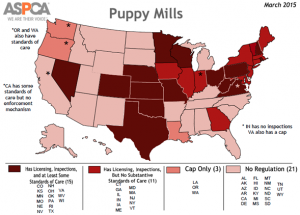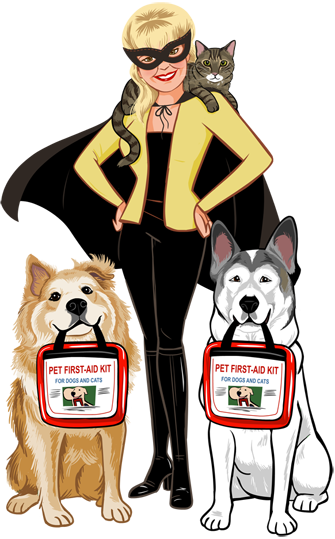
What is wrong with this picture?!
- An estimated 170,000 breeding dogs are currently living in United States Department of Agriculture (USDA)-licensed commercial facilities for breeding purposes this very moment.
- An estimated 10,000 puppy mills exist in the United States (this includes both licensed and unlicensed facilities).
- Over 2 million puppies are bredin mills each year.
- While an estimated 3 million dogs are euthanized in shelters every year.
Not much different from a factory farm where livestock are lined up to breed over and over again, a puppy mill is also a breeding operation that breeds dogs for profit. Financial gain over the health & well-being of the animals is prime. Breeding parents may be kept in cages 24/7 or their entire lives (except when mating), no exercise required. Many of these dogs never get to place paw on grass as they live in stacked wired cages, urinating and defecating on the dogs less fortunate to reside in the cage below. Cages may only be 6” larger than the dog’s body (not including the tail), and there is no limit to how many dogs may be at a facility. Females can be mated every breeding cycle, and when they and the older males outlive their usefulness, do not have to be euthanized humanely – many are shot or drowned!
Most surprising to many is that puppy mills are legal. The standards governing the care of dogs and cats in commercial breeding facilities are set forth in the federal Animal Welfare Act (AWA). The United States Department of Agriculture (USDA) is the agency responsible for overseeing the commercial dog breeding industry and enforcing the AWA.
Any breeder who wishes to sell to a pet store or to consumers over the Internet with five or more breeding females must be licensed with the USDA, but that license does not provide any assurance of quality or humane breeding. It only means that the breeder is held to very minimal standards of care. Some facilities may be better than others, but when you find limited to no veterinary care, little staffing and/or humane living conditions, you know it’s not a good situation for the dogs. These expensive ‘extras’ (which any humane person would consider a necessity) cut into profits, so mills keep overhead costs low by neglecting care and decent living arrangements.
Nearly all puppies sold at pet stores come from puppy mills. Pet stores are the primary sales outlet for puppy mills and are essential for keeping puppy mills in business.
Brokers obtain puppies from breeders, transport them, and then re-sell them to pet stores – they are the proverbial ‘middle man.’ A broker is required to possess a Class B USDA license to operate and is a key link in the puppy mill supply chain as most pet stores obtain their puppies from brokers, and not directly from the breeders. Brokers often ship large quantities of puppies at a time for long distances in crowded conditions. They can be go up to 12 hours without being provided food or water and are confined in a small space where diseases can be easily transmitted. Many do not survive the transport.
Please however, do not confuse a puppy mill with a responsible breeder! Responsible breeders know their breed(s) and are single-minded of purpose in perpetuating the line to the best possible degree. Not only are the dogs well-fed, exercised, socialized and cared for (including medically), but a responsible breeder will screen anyone wishing to purchase one of his or her dogs and…for the lifetime of that dog, will demand it be returned to the breeder should the adopter no longer be able to care for him. Responsible breeders do not sell to pet stores, and are prohibited from doing so by their breed club guidelines.
On the other hand, never be fooled if a pet store assures you the puppy was raised with the highest of care. Breeders licensed to sell to pet stores only have to meet the USDA’s minimal standards which are not adequately enforced. The USDA has an estimated 100+ inspectors on staff to inspect over 10,000 facilities!
With due diligence, you can trace the origin of a puppy sold in a pet store through federal and state records. Commercial breeding facilities that sell to pet stores must be licensed by the USDA. When a puppy is shipped out of state, a veterinarian must file a health certificate with the state department of agriculture for every puppy shipped into the state that identifies the breeder or broker. By looking at the breeder or broker on the health certificates, or by going into the pet store and looking at the name of the breeder, you can see where pet stores are sourcing their puppies from.
Pet stores are culpable for sustaining and perpetuating the puppy mill industry by being the end of the supply chain, so the way to decrease the number of puppy mills is to stop the demand for store-sold dogs. Millions of dogs are in shelters this very minute, so putting puppy mills out of business will not create a shortage of man’s best friend! Many shelters and rescues have puppies available, and there are thousands of puppies available on reputable adoption sites (ie: www.Petfinders.com). Reputable pet stores also allow adoptions from rescues on their premises. More than 70 U.S. cities have passed retail ordinances preventing puppy mill dogs from being sold at local pet stores.
Looking for a specific breed? Breed rescues of all sorts exist with full-bred dogs seeking their forever homes. At any given time, 25% of the dogs in local shelters are full-breeds, and special mixes can also be found without buying a puppy mill dog.

What can you do?
- Educate yourself on pending animal welfare legislation, and let your representatives know that animal welfare legislation and puppy mills are an extremely important issue to you. Tell them why but be prepared to think “big picture,” in how the laws affect municipalities and populations in addition to the animals.
- Contact your representatives. Politicians do care about issues that are important to their constituents because you re-elect them or NOT! Find yours here http://action.humanesociety.org/site/PageServer?pagename=HSLF_elected_officials_federal
- Review the Humane Score Card that shows federal legislators’ records on animal issues so that you can stay-in-the-know.
- Visit your local pet store and make it known that you do not want puppy mill dogs sold in your city. If they don’t change their ways, bring it up to your City Council and don’t stop until mission is accomplished.
- Educate others who may be misinformed thinking puppy mills are farms where dogs romp and play.
The second week in May is “Puppy Mill Action Week,” but the best time to start any change is always…TODAY!
Please also view my VLOG on this topic at https://youtu.be/f85rMkzb5WQ








